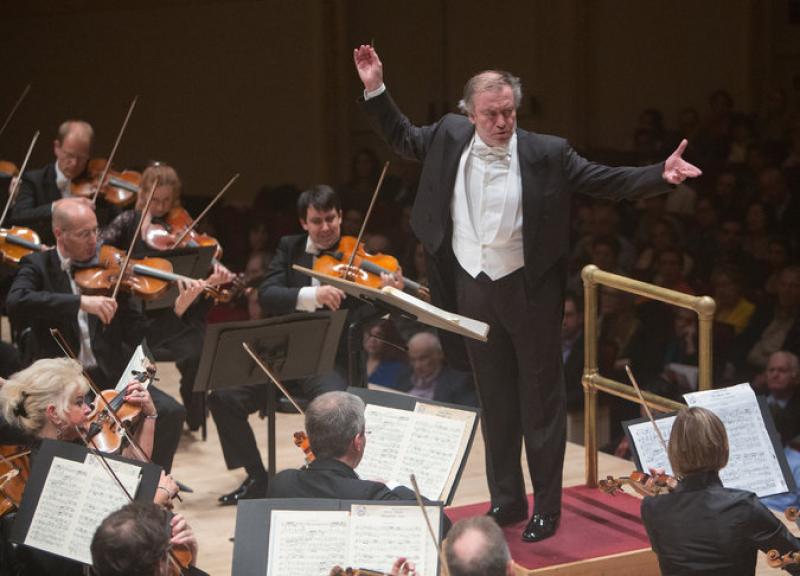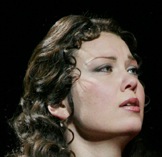Betrothal in a Monastery, Maryinsky Opera, Cardiff | reviews, news & interviews
Betrothal in a Monastery, Maryinsky Opera, Cardiff
Betrothal in a Monastery, Maryinsky Opera, Cardiff
Prokofiev comedy semi-staged with wit and lyrical eloquence

It’s one of the ironies of life and art that Prokofiev’s tenderest and most romantic opera was composed at a time when he was abandoning his wife in favour of a Moscow literature student half his age. Betrothal in a Monastery is a setting in Russian of an opera libretto by Sheridan about the attempt of a Spanish grandee to marry off his young daughter to an elderly fish merchant.
The trauma of such events naturally plays little or no part in the opera, which is a comedy of disguise and mistaken identity in the tradition of Rossini’s Barber and Donizetti’s Don Pasquale. It hangs on the usual devices of characters engaged to people they’ve never set eyes on, or incapable of recognising their own fiancée in a borrowed cloak, with the added element of a Spanish code of honour so strict that a girl will take the veil rather than forgive her lover for entering her bedroom innocently but uninvited.
You might suppose that such a farrago would depend on stage and costume to bring it to life. But it was precisely part of the fun of the Maryinsky’s performance under Valery Gergiev in Cardiff’s Wales Millennium Centre on Sunday that the semi-staging glossed over all such superficial details and instead threw itself into the situations provoked by the underlying confusions of motivation and the vitality of the individual characters. Even the fish merchant Mendoza’s beard, which is talked about so often that it almost assumes a separate identity (like the nose in Shostakovich’s opera), remained invisible on the highly mobile face of Sergey Aleksashkin, who certainly did sport luxuriant facial hair when he sang the role a few years ago at Glyndebourne.
The vocal writing is exquisite and stylish, the orchestration a comedy of sound in its own right
The magic ingredient that transforms this nonsense into memorable theatre is of course Prokofiev’s music, some of the wittiest and at the same time most lyrically engaging in any comic opera of the last century. Why on earth such an enchanting piece hasn’t entered the repertory of every self-respecting opera company is one of the mysteries of modern arts planning. It has pace, authentic musical humour, melody such as everyone knows to have been at Prokofiev’s command more or less at will; the vocal writing is exquisite and stylish, the orchestration not just expert but full of invention – a comedy of sound in its own right.
No doubt the work has suffered from its Soviet connections. It was composed in 1940, by which time Prokofiev had been fully reabsorbed into post-purge Russia (Vsevolod Meyerhold, who had been due to direct Prokofiev’s previous opera, Semyon Kotko, had been murdered by the NKVD five months before). Yet the taint of Stalin hasn’t inhibited the popularity of Romeo and Juliet or the Fifth Symphony, works close in time and idiom to Betrothal. Perhaps in the end the Russian language, with its strange alphabet and (supposedly) coarse rhetoric, is to blame. Luckily, there are now wonderful Russian singers around to disprove such silliness, and there was a full gallery of them on show at this performance.
 Aleksashkin and Evgeny Akimov (as the cash-strapped grandee Don Jerome) set the tone in their sparkling opening exchanges on the subject of fish and young wives – comparable topics in Mendoza’s eyes. There was no credit in the programme for the well-oiled front-of-stage action (perhaps by Vladislav Pazi, who directed the Maryinsky production currently in rep); but it deserved one, not least because it brought the singers close to the audience, a contact evidently relished by both parties. Dmitry Voropaev sang the tenor/lover Don Antonio’s serenade with lovely, effortless tone; Anastasia Kalagina (pictured right) was coolly charming and light-voiced as his beloved Louisa, Mendoza’s marital target, though he is (rather easily, it may seem) tricked into marrying the duenna of Sheridan’s title, played here with a nice blend of dignity and self-parody by Larisa Diadkova.
Aleksashkin and Evgeny Akimov (as the cash-strapped grandee Don Jerome) set the tone in their sparkling opening exchanges on the subject of fish and young wives – comparable topics in Mendoza’s eyes. There was no credit in the programme for the well-oiled front-of-stage action (perhaps by Vladislav Pazi, who directed the Maryinsky production currently in rep); but it deserved one, not least because it brought the singers close to the audience, a contact evidently relished by both parties. Dmitry Voropaev sang the tenor/lover Don Antonio’s serenade with lovely, effortless tone; Anastasia Kalagina (pictured right) was coolly charming and light-voiced as his beloved Louisa, Mendoza’s marital target, though he is (rather easily, it may seem) tricked into marrying the duenna of Sheridan’s title, played here with a nice blend of dignity and self-parody by Larisa Diadkova.
This is an opera with many supporting roles, not all of them obviously essential to the plot. Louisa’s friend Clara seems mainly there to provide vocal contrast, but has one beautiful aria in the convent to which she retreats, a rare passage of inwardness which Yulia Matochkina – a somewhat static actress – dispatched with marvellous warmth of tone. Roman Burdenko played her lover (Louisa’s brother, Ferdinand, also a target for Don Jerome’s nuptial ambitions) as a mildly ineffectual figure who might put up token resistance to paternal pressure. Evgeny Ulanov came and went as the priggish, well-meaning but prurient Don Carlos, without ever quite establishing a significant role in the drama.
On top of all this, Prokofiev introduced elements of commedia dell’arte as in his much earlier Love of Three Oranges. The revellers, servants and drunken monks all come in threes, like Puccini’s Ping, Pang and Pong, sung here with growing enthusiasm by Andrey Popov, Yury Vlasov and Alexander Gerasimov. And the Maryiinsky caravan also includes a chorus of fishwives and assorted wedding guests, along (naturally) with the wonderful orchestra, all of whom plainly enjoyed the show almost as much as the audience – presenting us with the unfamiliar sight of a smiling body of Russian musicians. Gergiev, running late as usual, held everything together with great aplomb. He obviously loves the work, and he made us love it too.
Add comment
The future of Arts Journalism
You can stop theartsdesk.com closing!
We urgently need financing to survive. Our fundraising drive has thus far raised £49,000 but we need to reach £100,000 or we will be forced to close. Please contribute here: https://gofund.me/c3f6033d
And if you can forward this information to anyone who might assist, we’d be grateful.

Subscribe to theartsdesk.com
Thank you for continuing to read our work on theartsdesk.com. For unlimited access to every article in its entirety, including our archive of more than 15,000 pieces, we're asking for £5 per month or £40 per year. We feel it's a very good deal, and hope you do too.
To take a subscription now simply click here.
And if you're looking for that extra gift for a friend or family member, why not treat them to a theartsdesk.com gift subscription?
more Opera
 Giustino, Linbury Theatre review - a stylish account of a slight opera
Gods, mortals and monsters do battle in Handel's charming drama
Giustino, Linbury Theatre review - a stylish account of a slight opera
Gods, mortals and monsters do battle in Handel's charming drama
 Susanna, Opera North review - hybrid staging of a Handel oratorio
Dance and signing complement outstanding singing in a story of virtue rewarded
Susanna, Opera North review - hybrid staging of a Handel oratorio
Dance and signing complement outstanding singing in a story of virtue rewarded
 Ariodante, Opéra Garnier, Paris review - a blast of Baroque beauty
A near-perfect night at the opera
Ariodante, Opéra Garnier, Paris review - a blast of Baroque beauty
A near-perfect night at the opera
 Cinderella/La Cenerentola, English National Opera review - the truth behind the tinsel
Appealing performances cut through hyperactive stagecraft
Cinderella/La Cenerentola, English National Opera review - the truth behind the tinsel
Appealing performances cut through hyperactive stagecraft
 Tosca, Royal Opera review - Ailyn Pérez steps in as the most vivid of divas
Jakub Hrůša’s multicoloured Puccini last night found a soprano to match
Tosca, Royal Opera review - Ailyn Pérez steps in as the most vivid of divas
Jakub Hrůša’s multicoloured Puccini last night found a soprano to match
 Tosca, Welsh National Opera review - a great company reduced to brilliance
The old warhorse made special by the basics
Tosca, Welsh National Opera review - a great company reduced to brilliance
The old warhorse made special by the basics
 BBC Proms: The Marriage of Figaro, Glyndebourne Festival review - merriment and menace
Strong Proms transfer for a robust and affecting show
BBC Proms: The Marriage of Figaro, Glyndebourne Festival review - merriment and menace
Strong Proms transfer for a robust and affecting show
 BBC Proms: Suor Angelica, LSO, Pappano review - earthly passion, heavenly grief
A Sister to remember blesses Puccini's convent tragedy
BBC Proms: Suor Angelica, LSO, Pappano review - earthly passion, heavenly grief
A Sister to remember blesses Puccini's convent tragedy
 Orpheus and Eurydice, Opera Queensland/SCO, Edinburgh International Festival 2025 review - dazzling, but distracting
Eye-popping acrobatics don’t always assist in Gluck’s quest for operatic truth
Orpheus and Eurydice, Opera Queensland/SCO, Edinburgh International Festival 2025 review - dazzling, but distracting
Eye-popping acrobatics don’t always assist in Gluck’s quest for operatic truth
 MARS, Irish National Opera review - silly space oddity with fun stretches
Cast, orchestra and production give Jennifer Walshe’s bold collage their all
MARS, Irish National Opera review - silly space oddity with fun stretches
Cast, orchestra and production give Jennifer Walshe’s bold collage their all
 Káťa Kabanová, Glyndebourne review - emotional concentration in a salle modulable
Janáček superbly done through or in spite of the symbolism
Káťa Kabanová, Glyndebourne review - emotional concentration in a salle modulable
Janáček superbly done through or in spite of the symbolism
 Buxton International Festival 2025 review - a lavish offering of smaller-scale work
Allison Cook stands out in a fascinating integrated double bill of Bernstein and Poulenc
Buxton International Festival 2025 review - a lavish offering of smaller-scale work
Allison Cook stands out in a fascinating integrated double bill of Bernstein and Poulenc

Comments
It was Stalin's favourite...
It was Stalin's favourite...
Your point being?
Your point being? Meistersinger was Hitler's favourite, but that shouldn't taint it. And 'Betrothal' doesn't even have a 'holy Russian art' moment - it's great operatic comedy pure and simple, if a bit long.